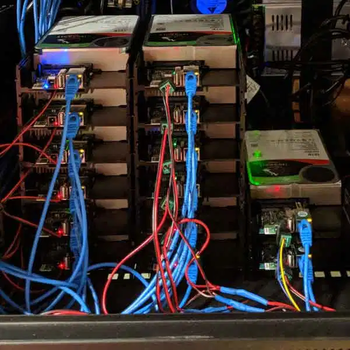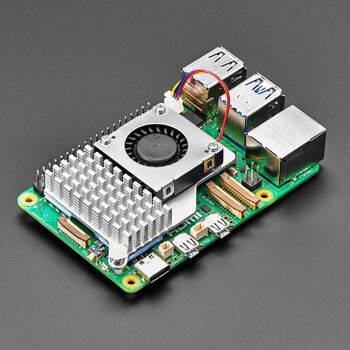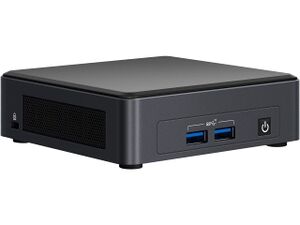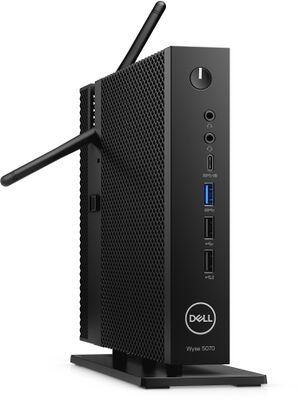We are still actively working on the spam issue.
Difference between revisions of "Home Server/Single Board Computers"
(→Intel NUCs and Thin clients) |
|||
| Line 44: | Line 44: | ||
==Intel NUCs and Thin clients== | ==Intel NUCs and Thin clients== | ||
| − | [[File:Intel-nuc.jpg | + | [[File:Intel-nuc.jpg|thumb|right|Intel NUC]] |
| − | [[File:Dell-wyse-5070-slim.jpg | + | [[File:Dell-wyse-5070-slim.jpg|thumb|left|Dell Wyse 5070 thin client]] |
''NUCs'' (Intel's name for a mini-PC) are significantly more powerful than a SBC but keep a similar form factor and efficiency. These run into the $500s new but can be found used for under $200. Just make sure you get one made within the last 10 years or else you will end up with a slow, power hungry paperweight. | ''NUCs'' (Intel's name for a mini-PC) are significantly more powerful than a SBC but keep a similar form factor and efficiency. These run into the $500s new but can be found used for under $200. Just make sure you get one made within the last 10 years or else you will end up with a slow, power hungry paperweight. | ||
''Thin clients'' are desktop PCs used for as a remote desktop terminal in corporate environments ([https://en.wikipedia.org/wiki/Thin_client more info here]). They are typically larger than a NUC and sometimes have room for a second SSD, RAM upgrades, or even rear IO modules. Thin clients are sometimes a bit cheaper than a NUC. | ''Thin clients'' are desktop PCs used for as a remote desktop terminal in corporate environments ([https://en.wikipedia.org/wiki/Thin_client more info here]). They are typically larger than a NUC and sometimes have room for a second SSD, RAM upgrades, or even rear IO modules. Thin clients are sometimes a bit cheaper than a NUC. | ||
Revision as of 02:56, 19 February 2024
For simple home server use, such as a file server or single user direct play PLEX server, these options are an inexpensive and energy efficient option for a home server. But, you will encounter performance issues if you try to load up your single board computer (SBC) and don't expect to be able to run virtual machines or transcoding.
Contents
Pros
- Silent operation (no fans).
- Low cost.
- Minimal hardware complexity.
- Easy to get up and running quickly.
Cons
- Expansion and upgrades are very limited.
- Nearly non-existent SATA ports.
- Limited USB ports.
- Adding more drives through USB can be slow and unreliable.
- MicroSD cards are unreliable.
TL;DR an SBC is a fantastic entry into the world of home servers. Just don't plan on running everything off of it forever.
SBC Choices
Raspberry Pi
The legendary Raspberry Pi is the gold standard of single board computers. The ecosystem features extensive hardware support and countless guides solving every issue you may encounter.
There are a few models to choose from:
- Raspberry Pi 5. The most powerful Pi with a 2.4GHz CPU and up to 8GB of RAM. But this comes at a price: you won't be able to find this board under $100. Performs best with active cooling (a fan).
- Raspberry Pi 4 Model B. Features 2 USB3 ports and up to 8GB of RAM. This model is a great balance between price and performance. About $80.
- Raspberry Pi 3 Model B+. The oldest Pi still in production. It lacks USB3 and only has 1GB of RAM, but it is the most affordable at $50.
- Raspberry Pi Zero 2 W. Broke-tier Pi at $30.
You'll want a beefy power supply and a case for your Pi.
Odroid
- Odroid N2+ recommended
- Ondroid HC4 storage server - Cheap two drive system
- Odroid HC2 is an option - if you don't mind dipping your toes into distributed systems.
NanoPi
More expensive than a Rpi4 but more powerful hardware with the option to install a x4 SATA HAT. Software support may be limited.
Intel NUCs and Thin clients
NUCs (Intel's name for a mini-PC) are significantly more powerful than a SBC but keep a similar form factor and efficiency. These run into the $500s new but can be found used for under $200. Just make sure you get one made within the last 10 years or else you will end up with a slow, power hungry paperweight.
Thin clients are desktop PCs used for as a remote desktop terminal in corporate environments (more info here). They are typically larger than a NUC and sometimes have room for a second SSD, RAM upgrades, or even rear IO modules. Thin clients are sometimes a bit cheaper than a NUC.



